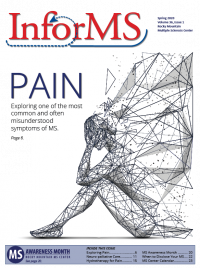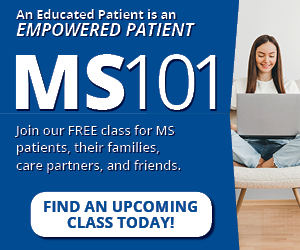MS Awareness Month is a chance to bring multiple sclerosis to the forefront, to help advocate for people and families living with MS every day, and to educate the public. This March, we’ve devoted the month to helping foster greater understanding of MS in our community.
MS is often an “invisible” disease. So many common symptoms can be truly life-altering to those living with them, but not always apparent to the outside world. We’ve created this page of basic MS information for patients and families living with MS, to help them share the facts about MS with loved ones, friends, co-workers, neighbors, and anyone else who may not have a great understanding of what it means to live with MS.
This MS Awareness Month, we invite you to not only read the information included here, but also to share it with others, especially on social media using the hashtag #MSAwareness. By answering some common questions, together we can build understanding of MS and how it affects those living with it.
MS: The Basics
MS is a disease of the central nervous system that disrupts communication between the brain and other parts of the body. The severity of the disease and its symptoms vary from person to person. The cause of MS is unknown and although there are treatments that can slow disease progression, at this time there is no known cure.
What is MS?
MS is a chronic disease of the brain, spinal cord and optic nerves. Three factors appear to have an influence on developing MS: genetic predisposition, environmental factors such a geographical location, and a trigger, such as a virus.
How Does MS Manifest?
The nerve fibers in the central nervous system are protected and made more effective by a fatty substance, myelin, which helps the nerve fibers conduct electrical impulses to and from the brain. MS produces injury in the central nervous system when the immune system mistakenly attacks myelin. Areas of myelin damage are known as plaques, or lesions, and these eventually fill in with scar tissue. The name multiple sclerosis means “many scars.” MS can also cause destruction of the entire nerve. The damage from lesions disrupts the transmission of nerve impulses from the central nervous system to the rest of the body causing a variety of symptoms.
Common MS symptoms often include (among many others):
- visual changes
- heat sensitivity
- muscle weakness
- problems with balance
- fatigue
- muscle spasms
- numbness
- emotional and cognitive changes
- anxiety
- depression
Many MS patients experience “quiet” periods when the disease is relatively dormant, but they may still be coping with one or a number of symptoms that aren’t apparent to the outside world. These patients can also have periods where the disease is quite active, known as exacerbations. During exacerbations, symptoms can be more pronounced, but usually subside and sometimes go away entirely soon after an exacerbation. Other patients may not experience dormant periods, and instead live with constant symptoms or a progressive worsening of the disease. MS can sometimes lead to disability, depending on a multitude of factors.
Every case of MS is different and every patient’s experience is unique. No person experiences the same symptoms in the same way, making MS a particularly difficult experience to explain or relate to others. At the Rocky Mountain MS Center, our focus is on treating the disease early and effectively with the aim of halting disease progression and maximizing the lifelong brain health of MS patients.
Who Gets It?
MS is most commonly diagnosed in young adults. Eighty percent of MS patients develop MS between the ages of 16 and 45. Women are more frequently diagnosed with MS by at least 2 to 1. MS is the leading cause of disability in young women and the second leading cause of disability in young men.
The worldwide prevalence is around 2.7 million, and nearly a million Americans have been diagnosed with the disease. In Colorado, we estimate that one in about 550 people have MS.
How is MS Treated?
It’s only been since 1993 that medications have been available to treat MS. Today there are more than 15 agents approved by the FDA for the treatment of MS, but these drugs are only partially effective.
Research efforts to improve MS treatment are ongoing, and much of that research is being done by the RMMSC right here in Colorado. An encouraging new frontier is exploring potential strategies for neuroprotection and neurorepair.
Learning More
Visit us at MSCenter.org/msmonth for more detailed information about MS, including links to our education portal, videos, webinars and more. Connect with us on Facebook, Twitter and LinkedIn by searching for “Rocky Mountain MS Center.” Once we’re connected, help us spread the word by using the #MSAwareness hastag.






